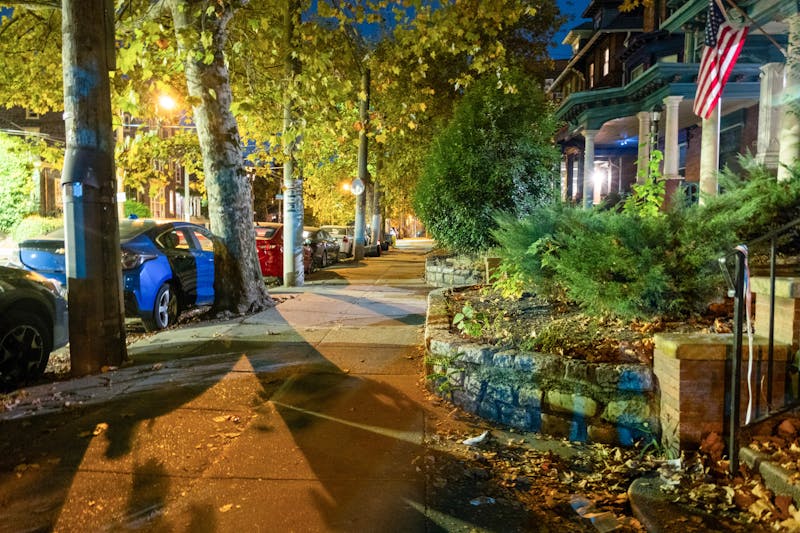In Philadelphia's graveyards, history comes alive. Take a stroll through the cobble-stoned heart of Old City, and you'll find some of America's earliest burial grounds.
Christ Church Burial Ground is one of these. On the corner of 5th and Arch streets, the church's property holds the graves of seven signers of the Declaration of Independence, including that of Benjamin Franklin.
Franklin's grave is littered with pennies from well-wishers - $3,000 a year's worth, according to Tourism Director Anne McLaughlin.
Philadelphia mayors, numerous naval notables and medicinal pioneers occupy some of the 4,000 or so grave sites - along with female domestics, merchants, slaves and infant children. The burial ground's youngest member is Edward Roberts (just three hours old), and its eldest member lived to be over a century.
Burial ground coordinator John Hopkins, who has devoted much of his life to the maintenance of these sites, knows the intricate histories of these graves.
Hopkins quit his full time job at a warehouse and began as a volunteer at the burial ground. "One day, I wandered into the burial ground. I felt a connection immediately when I got there," Hopkins said. "It just felt like a calling."
In some ways, the grounds can be more instructive than a visit to more notable sites like the Liberty Bell or Independence Hall. Of all 4,000 graves, only about 1,400 are identified. Some of the unmarked graves belong to slaves, and others, through neglect, have sunken into the ground.
They offer a broad and unparalleled segment of Philadelphia's social history.
"Some of the best stories in American history are yet to be told," said senior guide and historian Neil Ronk.
One such untold story is that of the 1793 yellow fever epidemic. According to Hopkins, the fever ran over the course of three months and killed 5,000 Philadelphians. About one of every ten graves in Christ Church is from a death during this year.
"It's the greatest catastrophe to hit the city of Philadelphia. It's our Katrina," said Ronk.
One of these yellow fever deaths included that of Maj. David Salisbury Franks.
Franks' burial here is interesting because he was the highest ranking Jewish officer in the Continental Army and he fell into disfavor as a chief staff officer to Benedict Arnold despite an otherwise brilliant diplomatic and military career.
"We try to tell the complex nature of who we are as Americans, not the easy stories," Ronk said. On July 3rd, in fact, Christ Church holds its Signer's Day celebration to honor the seven signers of the Declaration on church property.
At the end of the day, the church conducts a reenactment called "An Act of Treason." This tradition honors the actions of Jacob Duche, the chaplain of the Continental Congress, who crossed out prayers to the royal family in his prayer book. The public display, widely regarded as one of the first acts of treason, preceded the Declaration of Independence.
He made "a leap of faith both politically and spiritually," Ronk said. "Most people who commit treason do so in the hope of never getting caught; this celebrates the courage to write your name on a document that everyone will see."
Despite all this rousing historical evidence, I can guess what you're thinking. Cemeteries? Aren't they creepy?
Actually, they can be very serene places in a modern city.
"There's a wonderful reassuring presence in an old burial ground, a general spiritualness to it," Ronk said.
Graveyards themselves also change with the times. Burial grounds gave way to expansive, well-manicured cemeteries in the 19th century as attitudes toward mourning shifted.
The idea of these park-like cemeteries reflects what Ronk calls "the 19th century celebration of morality" in which families would picnic beside their ancestors' graves.
Woodlands Cemetery, just blocks away from campus on Baltimore Avenue, is one such example.
This 4th of July, sidestep those sweaty swarms of tourists and visit a graveyard.
"It's a reminder that old burial grounds, in some way, are the repository of the city's history - of the city and its collective memories," Ronks said. In visiting these sites, we keep Philadelphia's revolutionary history alive.
"Ben Franklin, in a sense, never died," Ronk said. "You know what he looks like, you know his accomplishments, you'd like to go and grab a beer with him. I mean, I'd like to go grab a beer with Ben Franklin."
Elizabeth Song is a College junior from Clemmons, N.C. Her e-mail address is song@dailypennsylvanian.com.
The Daily Pennsylvanian is an independent, student-run newspaper. Please consider making a donation to support the coverage that shapes the University. Your generosity ensures a future of strong journalism at Penn.
DonatePlease note All comments are eligible for publication in The Daily Pennsylvanian.







